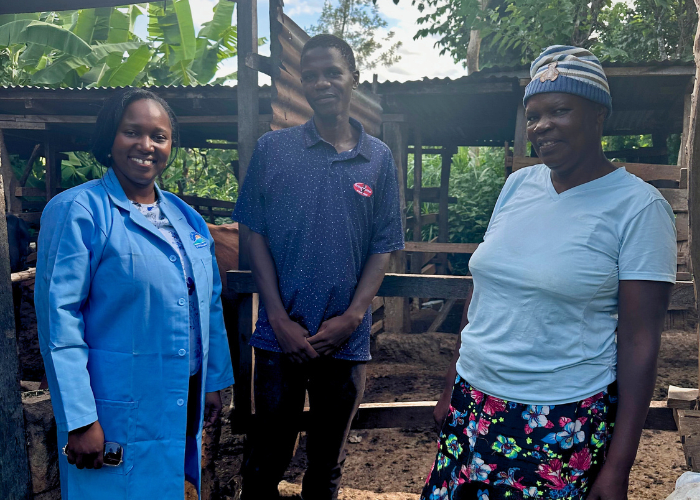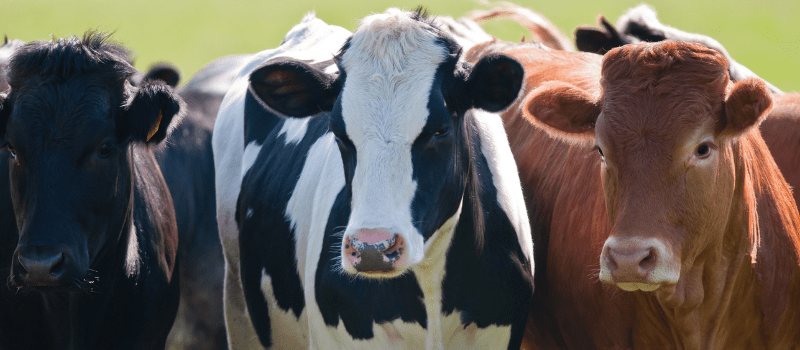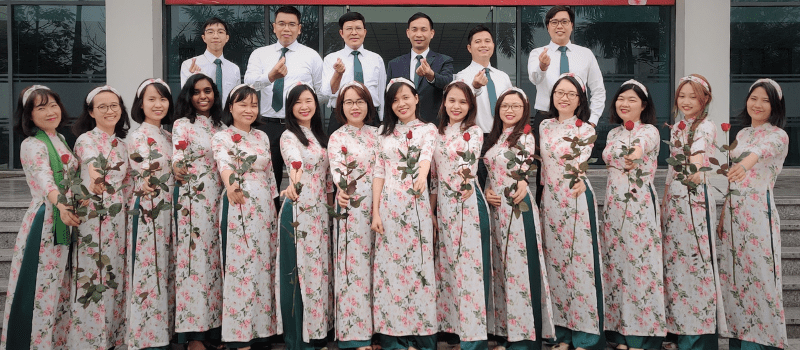This blog was written by Megan Sylka, Senior Program Officer at VWB, reflecting on a trip taken to Kenya in May 2025 to strengthen partnerships and advance implementation of our Volunteers Engaged in Gender-Responsive Technical Solutions (VETS) program.
One of the most powerful aspects of the VETS program is its long-term approach to community development. Rather than one-time interventions, the program builds lasting relationships, providing sustained support to smallholder farmers as they learn, adapt, and grow.
Ann Kagwira, a dairy farmer in Meru County, Kenya, is a clear example of the impact this ongoing support can have. First trained as a Community One Health Champion (COHC) during the early years of the program in 2021–2022, Ann has continued to receive mentorship from VETS volunteers and local partner Meru Dairy. With each new season—and each new learning opportunity—she has continued to improve her farm, her herd, and her confidence as a leader in her community.
 PHOTO: Ann (right) with her son Eric and VWB's Kenya program manager, Esther.
PHOTO: Ann (right) with her son Eric and VWB's Kenya program manager, Esther.
 PHOTO: Ann (center) meets with VETS volunteers and partners at her farm in 2025.
PHOTO: Ann (center) meets with VETS volunteers and partners at her farm in 2025.
From Five Cows to Forty-Five Litres
When I visited Ann’s farm in May 2025, I was struck by how much had changed since her initial training. Ann and her son Eric, who helps manage the farm when he’s not studying medicine at a nearby university, proudly described the evolution of their dairy operations.
Back in 2021, Ann was producing around 20–22 litres of milk per day from five cows. Today, she’s producing 45 litres a day—from just two cows. That kind of productivity shift reflects not only better genetics and nutrition, but an impressive gain in efficiency, care, and cow management.
Prioritizing Cow Comfort for Stronger Herd Health
Ann has made significant upgrades to improve cow comfort, a key theme reinforced during earlier training sessions with past VETS volunteers—including Dr. Remmy, a veterinarian, and Priscillah, an Animal Health Specialist. With their guidance, she improved her barn’s flooring to make it easier to clean and reduce the risk of infections. She also added better bedding and adopted hygiene practices to keep her animals clean and healthy.
These changes may seem small, but they are deeply important. As one volunteer put it, "Comfortable cows are productive cows." And Ann’s results speak for themselves.
New Challenges, New Ideas: A Collaborative Field Visit
Our May 2025 visit brought together a vibrant group of local and international partners: Eric Muthomi, an Extension Officer at Meru Dairy; current VETS volunteers Riley Bauman (a recent DVM graduate from the Ontario Veterinary College), Méli-Jade Levéillé-Blais, and Grace Friesen; and VETS Technical Advisor Frank van der Meer.
Together, the group assessed new challenges Ann is facing—particularly around cow nutrition. With higher milk yields, the nutritional demands on her animals have increased. After careful observation and discussion, the team suspected a mineral deficiency in the diet and emphasized the need for balanced, higher-quality feed to maintain animal health and milk production.
Eric, Ann’s son, was particularly engaged in the conversation. Though still a student, he’s attended numerous farmer trainings and is passionate about animal care and public health. He spoke with insight and empathy about his mother’s journey, and his own aspirations to become a doctor specializing in obstetrics and gynecology—driven by the maternal health challenges he’s seen in their region. His presence at the visit reflected the broader vision of One Health in action: a holistic understanding of how animal health, human health, and community well-being are all interconnected.
Why Long-Term Support Matters
Ann’s story is about more than increased milk yields. It’s about what becomes possible when farmers have long-term access to training, support, and a trusted network of peers and mentors. Her journey shows how initial learning, when paired with ongoing follow-up and collaboration, can lead to lasting change.
The VETS program runs from 2020 through 2028. That long horizon allows for more than one-off improvements. It makes space for transformation. Farmers like Ann not only have time to implement what they learn, but to adapt it to changing conditions, troubleshoot challenges, and build resilience with every season.
Knowledge That Grows and Spreads
As a Community One Health Champion, Ann is now in a position to share her growing expertise with others. Her work doesn’t stop at her own barn—it ripples outward to her neighbours, peers, and the wider farming community. With each visit, each discussion, and each shared learning, the impact of the program deepens.
This visit reminded me that stronger farms aren’t built in a day—and neither are stronger communities. They require time, commitment, and teamwork. Ann’s farm is still evolving, but her story is proof that with the right support, lasting progress is not only possible—it’s already happening.
VETS is an 8-year initiative (2020-2028) to improve the economic and social well-being of marginalized people, particularly women and girls, in 6 countries across Africa and Asia. In collaboration with local partners, the program is implemented through 190 Canadian volunteers on international assignment and is generously funded by Global Affairs Canada. Learn more.





